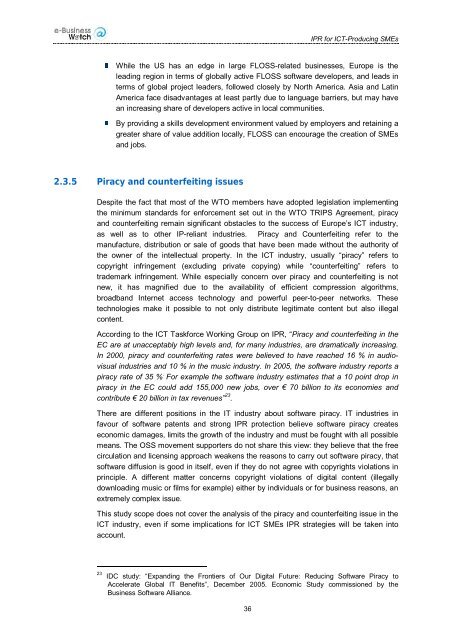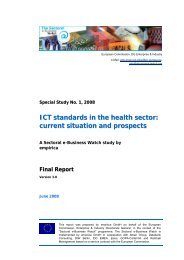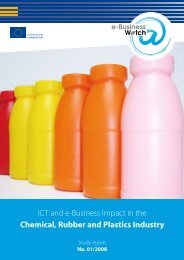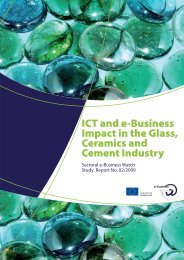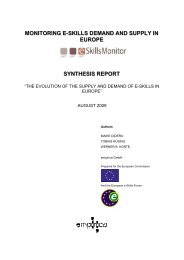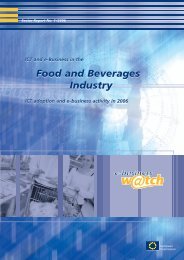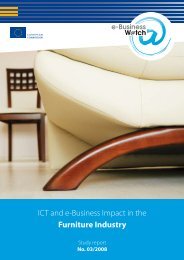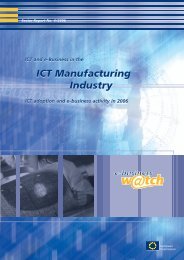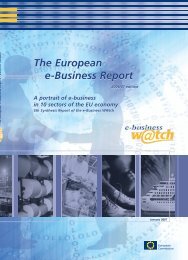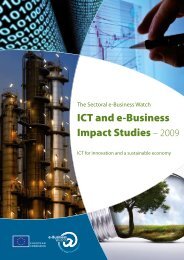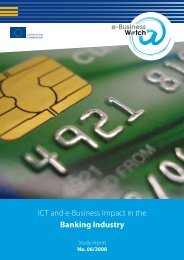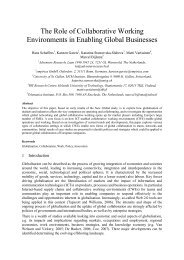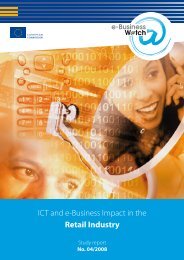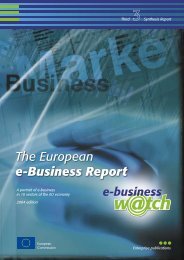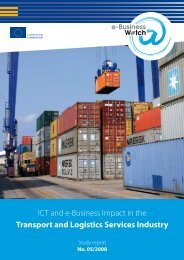Intellectual Property Rights and Competitiveness - European ...
Intellectual Property Rights and Competitiveness - European ...
Intellectual Property Rights and Competitiveness - European ...
- No tags were found...
Create successful ePaper yourself
Turn your PDF publications into a flip-book with our unique Google optimized e-Paper software.
IPR for ICT-Producing SMEsWhile the US has an edge in large FLOSS-related businesses, Europe is theleading region in terms of globally active FLOSS software developers, <strong>and</strong> leads interms of global project leaders, followed closely by North America. Asia <strong>and</strong> LatinAmerica face disadvantages at least partly due to language barriers, but may havean increasing share of developers active in local communities.By providing a skills development environment valued by employers <strong>and</strong> retaining agreater share of value addition locally, FLOSS can encourage the creation of SMEs<strong>and</strong> jobs.2.3.5 Piracy <strong>and</strong> counterfeiting issuesDespite the fact that most of the WTO members have adopted legislation implementingthe minimum st<strong>and</strong>ards for enforcement set out in the WTO TRIPS Agreement, piracy<strong>and</strong> counterfeiting remain significant obstacles to the success of Europe’s ICT industry,as well as to other IP-reliant industries. Piracy <strong>and</strong> Counterfeiting refer to themanufacture, distribution or sale of goods that have been made without the authority ofthe owner of the intellectual property. In the ICT industry, usually “piracy” refers tocopyright infringement (excluding private copying) while “counterfeiting” refers totrademark infringement. While especially concern over piracy <strong>and</strong> counterfeiting is notnew, it has magnified due to the availability of efficient compression algorithms,broadb<strong>and</strong> Internet access technology <strong>and</strong> powerful peer-to-peer networks. Thesetechnologies make it possible to not only distribute legitimate content but also illegalcontent.According to the ICT Taskforce Working Group on IPR, “Piracy <strong>and</strong> counterfeiting in theEC are at unacceptably high levels <strong>and</strong>, for many industries, are dramatically increasing.In 2000, piracy <strong>and</strong> counterfeiting rates were believed to have reached 16 % in audiovisualindustries <strong>and</strong> 10 % in the music industry. In 2005, the software industry reports apiracy rate of 35 % . For example the software industry estimates that a 10 point drop inpiracy in the EC could add 155,000 new jobs, over € 70 billion to its economies <strong>and</strong>contribute € 20 billion in tax revenues” 23 .There are different positions in the IT industry about software piracy. IT industries infavour of software patents <strong>and</strong> strong IPR protection believe software piracy createseconomic damages, limits the growth of the industry <strong>and</strong> must be fought with all possiblemeans. The OSS movement supporters do not share this view: they believe that the freecirculation <strong>and</strong> licensing approach weakens the reasons to carry out software piracy, thatsoftware diffusion is good in itself, even if they do not agree with copyrights violations inprinciple. A different matter concerns copyright violations of digital content (illegallydownloading music or films for example) either by individuals or for business reasons, anextremely complex issue.This study scope does not cover the analysis of the piracy <strong>and</strong> counterfeiting issue in theICT industry, even if some implications for ICT SMEs IPR strategies will be taken intoaccount.23 IDC study: “Exp<strong>and</strong>ing the Frontiers of Our Digital Future: Reducing Software Piracy toAccelerate Global IT Benefits”, December 2005. Economic Study commissioned by theBusiness Software Alliance.36


